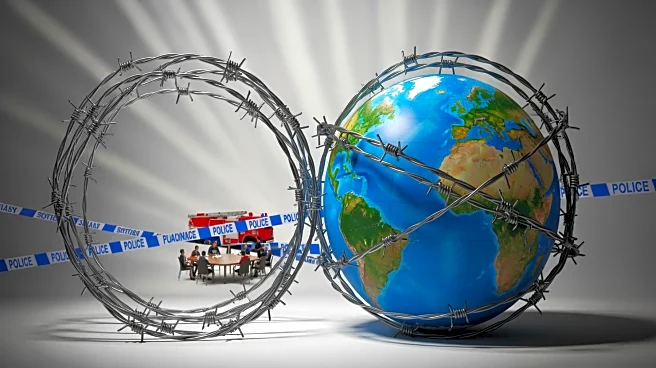What's Happening?
The responsibilities and composition of an International Security Force (ISF) in Gaza are currently under debate. The force is intended to play a role in the ongoing Israel-Hamas conflict, particularly in the aftermath of hostilities. However, it remains
uncertain which nations will contribute to this force and what specific actions it will be authorized to take against Hamas. The discussion comes as tensions continue in the region, with recent events including the handover of hostages by Hamas. The situation is complex, with various international stakeholders potentially involved in shaping the future security landscape in Gaza.
Why It's Important?
The establishment and operational scope of the ISF in Gaza are critical for regional stability. If effectively implemented, the force could help maintain peace and prevent further escalation between Israel and Hamas. The involvement of international actors in the ISF could also influence diplomatic relations and power dynamics in the Middle East. Countries contributing to the force may gain strategic influence, while the force's actions could impact humanitarian conditions in Gaza. The uncertainty surrounding the ISF's mandate highlights the challenges of international cooperation in conflict zones.
What's Next?
The next steps involve determining the nations that will participate in the ISF and defining its operational mandate. Key stakeholders, including Israel, Hamas, and potential contributing countries, will likely engage in negotiations to establish the force's framework. The outcome of these discussions could affect future peace efforts and the security situation in Gaza. Observers will be watching for announcements regarding the ISF's composition and responsibilities, which could signal shifts in international policy towards the Israel-Hamas conflict.
Beyond the Headlines
The debate over the ISF's role in Gaza raises broader questions about international intervention in conflict zones. Ethical considerations include the sovereignty of local governance versus the need for external peacekeeping. The long-term implications of an international force in Gaza could influence global norms regarding conflict resolution and humanitarian intervention. Additionally, the presence of foreign troops may affect local perceptions and cultural dynamics within Gaza.
















